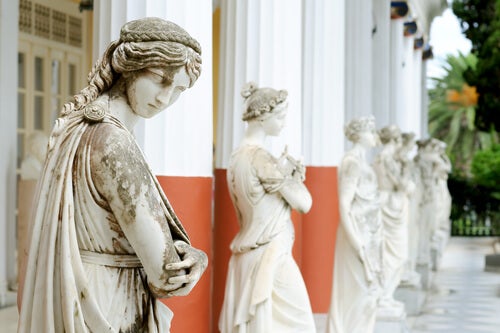The myth of the muses, the power of inspiration
 buy modafinil australia
buy modafinil australia п»їThe myth of the muses is one of the best known myths of antiquity. These divine beings are still alluded to as the source of inspiration for the various creators, in the arts and sciences. In fact, the word music comes from their name, as well as the word museum.
According to the different versions of the myth of the muses, they were the natural companions of Apollo, god of music and the arts. Apollo had romances with all the muses, at different times, and from these furtive loves arose a large number of offspring.
The myth of the muses says that they were cheerful and festive young women, who descended to earth to whisper creative ideas in the ear of mortals. If they were able to listen to this advice, they produced marvelous works that aroused admiration. Those who were not visited by the muses ultimately created nothing.
"Muses don't charge royalties."
-JoaquГn Sabina
ApolloThe origin of the myth of the musesThe myth of the muses states that they were the daughters of Zeus, the god of Olympus, and Mnemosyne, a titan who represented memory. She, in turn, was the daughter of Gaea, the earth mother, and Uranus, personification of the sky. It is said that Mnemosyne and Zeus lay together for nine nights and that for each night a muse was born.
Mythological stories tell that in the underworld there was a river called Mnemosine, next to another called Lethe. Most mortals were invited to drink from the river Lethe before being reincarnated as a new being; the waters of that source made them forget their previous lives and start anew.
On the other hand, the myth of the muses tells that only some chosen ones were invited to drink from the river Mnemosine. They could remember previous lives and in their next incarnation they became visionaries and prophets.
The nine musesAlthough there are stories that speak of other muses, classical history says that there are nine and that each of them is in charge of some field of knowledge or artistic creation. It was supposed that if the right muse visited the creator, he would have sudden and wonderful revelations to complete his work. The nine classical muses are the following:
Calliope or "she of the beautiful voice." She was the muse of eloquence and epic poetry. She wore a laurel wreath and carried a lyre. She was Apollo's lover and mother of Orpheus, Lalemus and Ressus.
Clio or "she who offers glory". Muse of history, that is, of the epic. Her role was to keep alive the memory of generosity and triumphs. She carried a trumpet and an open book.
EratГі or "the loving one". Muse of lyric-amorous poetry, who wore a crown of roses on her head and carried a zither. She was also Apollo's lover and mother Tamiris.
Euterpe or "the very pleasant one". Muse of music, in particular, of the interpretation of the flute. She was represented with a crown of flowers.
Melpomene or "the melodious one". Muse of tragedy, or rather of tragic narrative or literary writing. She dressed lavishly and wore a tragic mask.
Polymnia or "she of many hymns". Muse of sacred songs and hymns. She was always dressed in white.
Thalia or "the festive one". Muse of comedy and bucolic poetry. She was the hostess at banquets and festivities.
Terpsichore or "she who delights in dance". Muse of dance and lyrical song. She wore garlands and was the mother of Terpsichore, the son she fathered with Apollo.
Urania or "the celestial". Muse of astronomy, teaching and exact sciences. He carried a globe and a compass.
The muses Urania and Calliope, Simon VouetThe presence of the musesAlthough the myth of the muses was very important for the Greeks, these beings do not really appear frequently in the stories of the gods, and when they do, they usually appear as secondary characters. Despite this, it was thought that their inspiration was fundamental for the action of all the protagonists.
It is said that King Piero of Pieria, in Thrace, had nine daughters with great gifts for singing. Their art was so beautiful that they decided to travel to Mount Helicon, where the muses lived, and challenge them. The muses gladly accepted.
When the nine young women began to sing, all the birds fell silent. Their song was so beautiful that nature fell silent. Then it was the turn of the muses, and when they sang, even the stones wept. Having won the competition, the muses decided to turn the nine young women into magpies to punish their arrogance.
You might be interested in...
Music and emotions
Who has never experienced certain feelings when listening to music? Consciously or unconsciously, music and emotions are related...
Love in infants is the best stimulus to bonding6 phrases to live with optimismIn life there is time for everything, except giving up. da658a7